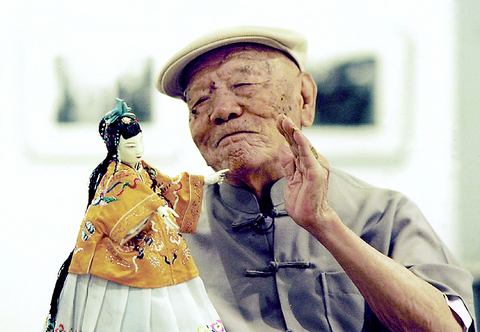Legendary Taiwanese puppet master Huang Hai-tai (
Relatives said Huang died at his home in Yunlin County weeks after coming down with pneumonia.
Hand puppetry was introduced to Taiwan by immigrants from China in the 19th century. Most puppet shows recount historical stories or feature Chinese swordsmanship.

PHOTO: CHEN CHIEN-CHUNG, AFP
The creativeness and innovation of Huang, his sons and grandchildren has contributed to the continuous prosperity of the art.
In the 1990s, Huang's grandchildren founded Pili International Multimedia Corporation (霹靂國際多媒體集團, PIMC), a multimillion-dollar firm that produces hand puppetry movies and TV series.
As a boy, Huang learned hand puppetry from his father, who was leader of a local puppet troupe.
PIMC's Web site said that in addition to performance skills, Huang had a vast knowledge of Chinese classical literature and used his ability to play several different musical instruments to embellish his performances.
Huang would also choreograph, sing and narrate during shows and established his own puppet troupe at the age of 25.
He skirted a ban on traditional Taiwanese art performances by giving puppet shows in Japanese.
"Although he never learned Japanese, he memorized lines in Japanese so that the Japanese couldn't ban his performances," Huang Chun-hsiung (
Huang was forced to move his performances indoors after the post-World War II Chinese Nationalist Party (KMT) government temporarily banned traditional outdoor performances after the 228 Incident.
In the 1950s, Huang Chun-hsiung used TV to increase the popularity of puppetry.
"When I was in high school the only thing we cared about after school was Huang's puppet shows on TV," said Chien Ling-yuan (簡玲媛), a woman now in her fifties. "We'd skip class for that."
However, in the 1970s, Huang Chun-hsiung's puppet shows were banned from TV because they were produced with Taiwanese dialogue. This conflicted with the KMT's policy calling for the use of Mandarin.
Huang's two sons later took over their aging father's puppetry troupe. In recent years, Huang's grandchildren have further augmented the show by adding such innovations as orchestra music and special effects.

INVESTIGATION: The case is the latest instance of a DPP figure being implicated in an espionage network accused of allegedly leaking information to Chinese intelligence Democratic Progressive Party (DPP) member Ho Jen-chieh (何仁傑) was detained and held incommunicado yesterday on suspicion of spying for China during his tenure as assistant to then-minister of foreign affairs Joseph Wu (吳釗燮). The Taipei District Prosecutors’ Office said Ho was implicated during its investigation into alleged spying activities by former Presidential Office consultant Wu Shang-yu (吳尚雨). Prosecutors said there is reason to believe Ho breached the National Security Act (國家安全法) by leaking classified Ministry of Foreign Affairs information to Chinese intelligence. Following interrogation, prosecutors petitioned the Taipei District Court to detain Ho, citing concerns over potential collusion or tampering of evidence. The

Seventy percent of middle and elementary schools now conduct English classes entirely in English, the Ministry of Education said, as it encourages schools nationwide to adopt this practice Minister of Education (MOE) Cheng Ying-yao (鄭英耀) is scheduled to present a report on the government’s bilingual education policy to the Legislative Yuan’s Education and Culture Committee today. The report would outline strategies aimed at expanding access to education, reducing regional disparities and improving talent cultivation. Implementation of bilingual education policies has varied across local governments, occasionally drawing public criticism. For example, some schools have required teachers of non-English subjects to pass English proficiency

‘FORM OF PROTEST’: The German Institute Taipei said it was ‘shocked’ to see Nazi symbolism used in connection with political aims as it condemned the incident Sung Chien-liang (宋建樑), who led efforts to recall Democratic Progressive Party (DPP) Legislator Lee Kun-cheng (李坤城), was released on bail of NT$80,000 yesterday amid an outcry over a Nazi armband he wore to questioning the night before. Sung arrived at the New Taipei City District Prosecutors’ Office for questioning in a recall petition forgery case on Tuesday night wearing a red armband bearing a swastika, carrying a copy of Adolf Hitler’s Mein Kampf and giving a Nazi salute. Sung left the building at 1:15am without the armband and apparently covering the book with a coat. This is a serious international scandal and Chinese

NEGOTIATIONS: The US response to the countermeasures and plans Taiwan presented has been positive, including boosting procurement and investment, the president said Taiwan is included in the first group for trade negotiations with the US, President William Lai (賴清德) said yesterday, as he seeks to shield Taiwanese exporters from a 32 percent tariff. In Washington, US Trade Representative Jamieson Greer said in an interview on Fox News on Thursday that he would speak to his Taiwanese and Israeli counterparts yesterday about tariffs after holding a long discussion with the Vietnamese earlier. US President Donald Trump on Wednesday postponed punishing levies on multiple trade partners, including Taiwan, for three months after trillions of US dollars were wiped off global markets. He has maintained a 10 percent